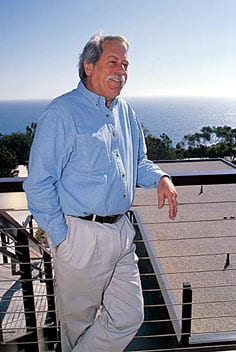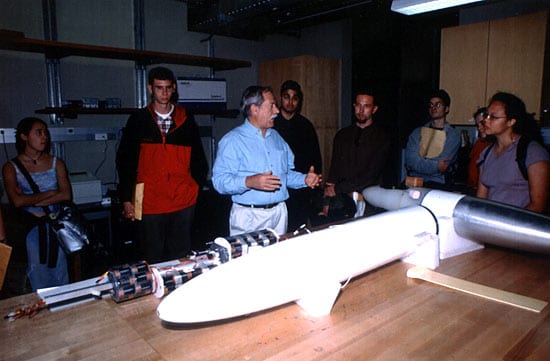WHOI Presents Stommel Medal to California Oceanographer Russ Davis
July 9, 2000
One of the Woods Hole Oceanographic Institution’s most prestigious awards will be presented June 14, 2000 to Professor Russ E. Davis of the Scripps Institution of Oceanography, University of California at San Diego. Davis will receive the Henry Stommel Medal in Oceanography and present a lecture, “Munk’s Law, Stommel’s Vision, and Ocean Observations,” at 2:00 p.m. Wednesday, June 14, at Clark Laboratory Room 507 on the Institution’s Quissett Campus. The lecture is free and open to the public.
Davis is being recognized for “his pioneering development of autonomous floats and their use to determine the ocean circulation.” In addition to the award lecture June 14, he will also deliver a science seminar, “Directly Observing the General Circulation” on Thursday, June 15, from 3 to 5 p.m. in Clark Laboratory Room 507. During his visit to the Institution he will meet with graduate students and postdoctoral fellows and scholars during a luncheon talk Friday, June 16, entitled “Serendipity, Discovery, and Fun in Oceanography.”
The Henry Stommel Medal in Oceanography is presented “for fundamental and enduring contributions to observing and understanding ocean processes.“ The award, a gold medal and monetary prize, is named for the late WHOI oceanographer Henry Stommel, who died in 1991 at age 71. The Stommel Medal was established by the WHOI Trustees in January 1993 in honor of the world renowned physical oceanographer who made many contributions to nearly every area of physical oceanography and is credited with establishing the modern concepts of ocean circulation. Stommel was highly regarded by his colleagues for his sense of humor, his zest for life, his generosity, and his inspiration to legions of oceanographers.
Davis is being honored for the development, deployment and successful use of the ALACE float and some of its profiling derivatives. The floats were used in almost every part of the world ocean during the World Ocean Circulation Experiment (WOCE) during the 1990s and are one of the principal tools for new programs planned as part of the Global Ocean Observing System (GOOS).
In recent years, Davis is best known for his role in developing autonomous, free-drifting, profiling floats and using them to measure circulation, temperature, and salinity in the upper ocean. He is currently at the forefront of efforts to deploy modern versions of these floats on a global basis, initiating key elements of the World Climate Research Program’s international study of climate variability (known as CLIVAR) and GOOS.
“As a leader in the physical oceanography community, Russ Davis has contributed significantly to such large scale programs as WOCE and CLIVAR, and he has also worked hard to ensure that funding will be available for major future field experiments,” the award committee noted. “Like Henry Stommel, Davis is considered to be an unselfish mentor and colleague who shares his best ideas and data with students and colleagues.”
The first recipient of the Stommel Medal was British oceanographer Dr. John C. Swallow, who received the award in February 1994. Dr. Swallow is perhaps best known in the ocean science community for the invention and development of the neutrally buoyant float, called the “Swallow float,” in the 1950s and its applications to deep-water circulation studies. He used the float to identify the Deep Western Boundary Currents off New England that had been predicted by Henry Stommel, then went on to search for the predicted slow poleward return flow in the ocean interior.


